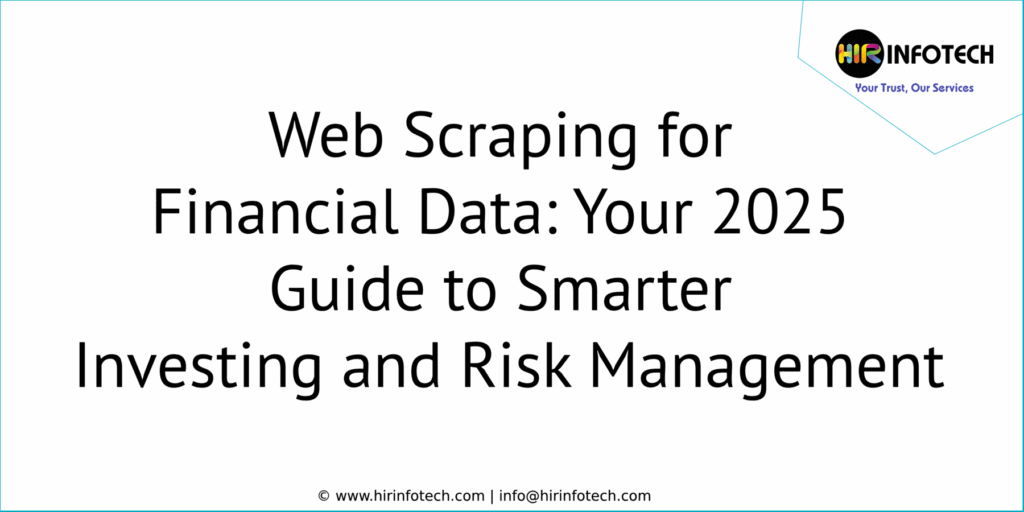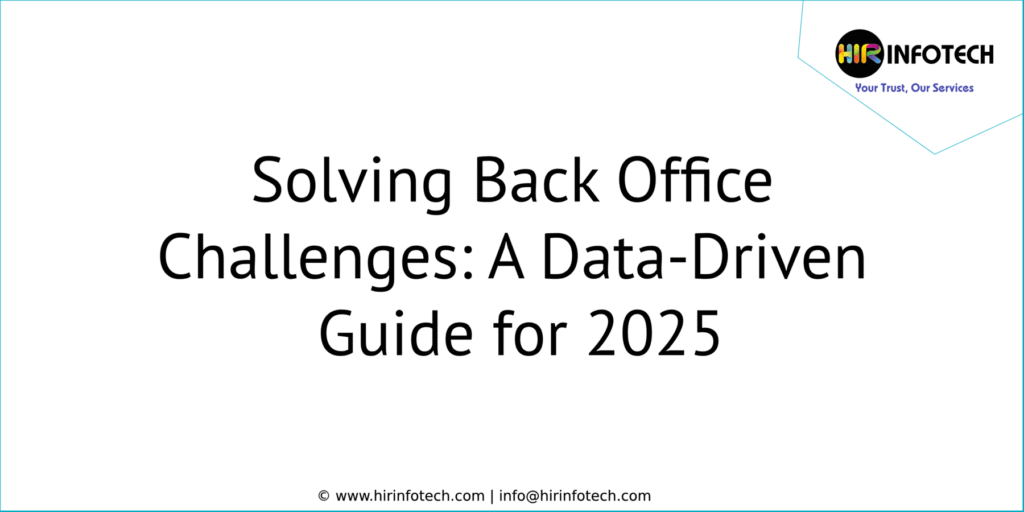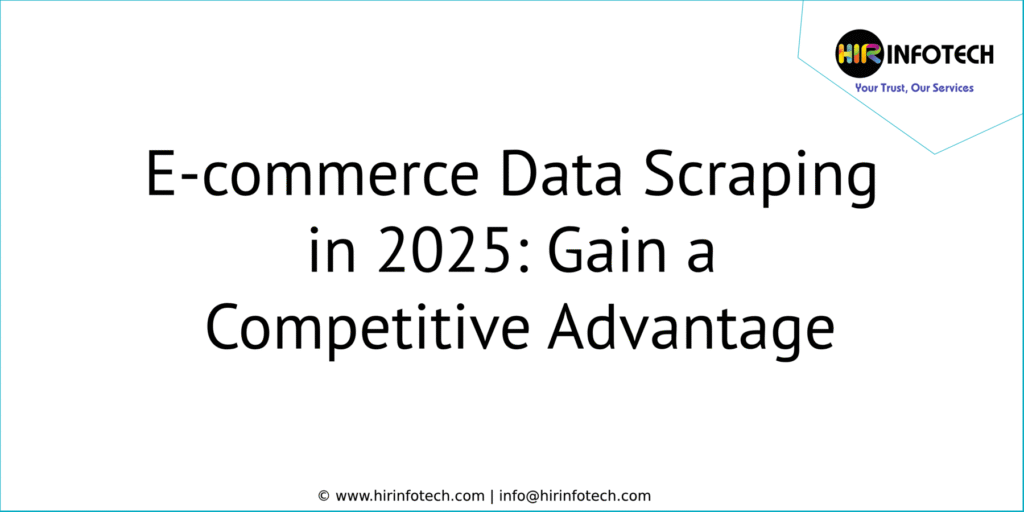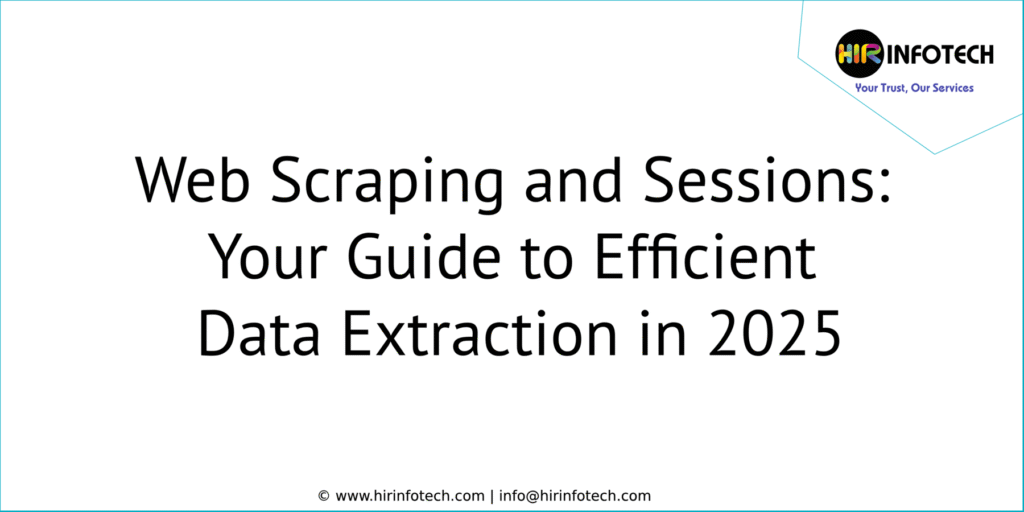
Introduction:
The financial world runs on data. Making smart investment decisions requires up-to-date information. Web scraping provides a powerful way to gather this critical data. This guide explains how web scraping can transform your financial analysis in 2025. No technical jargon, just clear, actionable insights.
What is Web Scraping? (A Simple Explanation)
Imagine a super-fast research assistant. This assistant automatically collects data from websites. That’s web scraping. It extracts information and organizes it into a usable format (like a spreadsheet or database). It’s like copying and pasting, but automated and on a massive scale.
Why Web Scraping is Essential for Financial Professionals in 2025
The financial landscape is increasingly complex and data-driven. Web scraping offers significant advantages:
- Real-Time Data: Track market changes as they happen. Make timely decisions.
- Comprehensive Data: Gather information from multiple sources. Get a complete picture of the market.
- Competitive Intelligence: Monitor your competitors’ activities, strategies, and performance.
- Risk Management: Identify potential risks and opportunities. Make informed decisions to protect your investments.
- Investment Research: Analyze financial data, company performance, and market trends. Find undervalued assets.
- Algorithmic Trading: Use scraped data to power automated trading systems.
- Cost Savings: Automate data collection. Reduce reliance on expensive data providers.
- Portfolio Management: It helps to optimize investment portfolio.
Key Use Cases of Web Scraping in Finance (Real-World Examples)
Web scraping can be applied to a wide range of financial tasks:
- Stock Market Analysis:
- What to Scrape: Stock prices, trading volume, company news, financial statements, analyst ratings, social media sentiment.
- Why It’s Valuable: Identify investment opportunities, track stock performance, predict market movements.
- Example: An investment firm could scrape stock prices from multiple exchanges to identify arbitrage opportunities.
- Economic Indicator Tracking:
- What to Scrape: Government websites (e.g., Bureau of Labor Statistics, Federal Reserve), financial news sites, economic data providers.
- Why It’s Valuable: Monitor key economic indicators (like GDP growth, inflation, unemployment) to inform investment strategies.
- Example: A hedge fund could scrape unemployment data to predict interest rate changes.
- Company Financial Data Extraction:
- What to Scrape: Company websites, SEC filings (EDGAR database in the US), financial news sites.
- Why It’s Valuable: Analyze company financial performance (revenue, profit, debt, cash flow). Assess company valuation.
- Example: A private equity firm could scrape company financial statements to identify potential acquisition targets.
- Alternative Data for Investment Research:
- What to Scrape: Social media sentiment, news articles, satellite imagery, shipping data, credit card transaction data (from ethical and legal sources). Note: Accessing and using some alternative data sources may require specific permissions or agreements.
- Why It’s Valuable: Gain unique insights that aren’t available from traditional financial data sources. Identify emerging trends and potential market disruptions.
- Example: A hedge fund could scrape satellite imagery of retail parking lots to estimate store traffic and sales.
- Real Estate Market Analysis:
- What to Scrape: Real estate listing websites (e.g., Zillow, Realtor.com), property records databases.
- Why It’s Valuable: Track property prices, identify investment opportunities, assess market trends.
- Example: A real estate investor could scrape listing data to identify undervalued properties in a specific area.
- Credit Risk Assessment:
- What to Scrape: Company financial data, news articles, credit rating agency reports (e.g., Moody’s, S&P, Fitch).
- Why It’s Valuable: Assess the creditworthiness of companies and governments. Make informed lending decisions.
- Example: A bank could scrape company financial data and news articles to assess the credit risk of a potential borrower.
- Commodity Market Tracking:
- What to Scrape: Price, News, Trading Volumes.
- Why It’s Valuable: Analyze supply chain and demand.
- Cryptocurrency Market Analysis
- What to Scrape: Price, trade data, news.
- Why It’s Valuable: To identify the best investment.
Ethical and Legal Considerations (Staying Compliant)
- Terms of Service: Always check the website’s terms of service. Many websites prohibit web scraping.
- Robots.txt: This file (e.g., www.example.com/robots.txt) indicates which parts of the website should not be scraped. Respect it!
- Rate Limiting: Don’t overload the website with requests. Scrape slowly and politely. Implement delays between requests.
- Personal Data: Be extremely cautious when scraping personal data. Comply with all relevant privacy laws:
- GDPR (General Data Protection Regulation): Applies to data from individuals in the European Union.
- CCPA/CPRA (California Consumer Privacy Act/California Privacy Rights Act): Applies to data from California residents.
- Copyright: Avoid scraping and using copyrighted material without permission.
- User-Agent: Identify your scraper with a clear and accurate User-Agent string. This is a standard practice and helps website owners understand who is accessing their site.
Why Custom Web Scraping is Crucial for Financial Data
The financial industry demands the highest levels of accuracy, reliability, and security. This is why a custom web scraping service (like Hir Infotech) is often the best solution:
- Data Quality is Paramount: Financial decisions are based on data. Errors can be extremely costly. Custom services prioritize data validation and cleaning.
- Complex Data Sources: Financial data often comes from complex websites with dynamic content and anti-scraping measures. Custom scrapers can handle these challenges.
- Real-Time Requirements: Many financial applications need real-time or near real-time data. Custom solutions can be designed for speed and efficiency.
- Scalability: Financial institutions often need to collect vast amounts of data from multiple sources. Custom services can scale to meet these demands.
- Security and Compliance: Financial data is highly sensitive. Custom services can implement robust security measures and ensure compliance with all relevant regulations.
- Integration: Seamlessly integrate the scraped data with your existing systems (trading platforms, risk management systems, databases).
- Maintenance: Websites change. A custom service will maintain and update the scraper to ensure continuous data flow.
The Web Scraping Process (Step-by-Step, with a Custom Service Focus)
- Consultation and Requirements Gathering: You discuss your specific data needs with the scraping service provider (e.g., Hir Infotech). This includes:
- Target Websites: Which websites contain the data you need?
- Data Points: What specific information do you want to collect (e.g., stock prices, company financials, news headlines)?
- Data Frequency: How often do you need the data updated (real-time, hourly, daily, etc.)?
- Data Format: How do you want the data delivered (CSV, Excel, JSON, database integration)?
- Budget and Timeline: What is your budget and timeline for the project?
- Website Analysis: The scraping experts analyze the target websites. They identify:
- Website Structure: How is the data organized on the page?
- Data Locations: Where are the specific data points located within the HTML?
- Anti-Scraping Measures: Are there any challenges to overcome (CAPTCHAs, IP blocking, etc.)?
- Dynamic Content: Does the website use JavaScript to load content dynamically?
- Scraper Development: The service provider develops a custom web scraper (typically using Python and libraries like Scrapy, Beautiful Soup, and Selenium). The scraper is designed to:
- Navigate the target websites.
- Extract the specified data points.
- Handle errors and exceptions.
- Bypass anti-scraping measures (ethically and legally).
- Clean and validate the data.
- Proxy Infrastructure Setup: The service sets up a robust proxy infrastructure to:
- Mask your IP address.
- Rotate IP addresses to avoid getting blocked.
- Bypass geo-restrictions (if necessary).
- Often, residential or mobile proxies are used for financial data scraping, as they are less likely to be blocked.
- Data Extraction: The scraper runs automatically, collecting the data from the target websites.
- Data Cleaning, Validation, and Transformation: The scraped data is processed to ensure accuracy and consistency. This includes:
- Removing Duplicates: Eliminating duplicate entries.
- Handling Missing Values: Dealing with missing data points (e.g., imputation or removal).
- Standardizing Formats: Converting data to consistent formats (e.g., dates, currencies, numbers).
- Data Type Validation: Ensuring data is in the correct format (e.g., numbers are numbers, dates are dates).
- Range Checks: Verifying that values fall within expected ranges.
- Cross-Referencing: Comparing data from multiple sources to ensure accuracy.
- Data Transformation: Converting data into the required format for your analysis or database.
- Data Delivery: You receive the cleaned and validated data in your preferred format:
- CSV or Excel Files: For easy import into spreadsheets.
- JSON Files: A common format for data exchange.
- Direct Database Integration: The data can be loaded directly into your database (e.g., MySQL, PostgreSQL, MongoDB).
- API Integration: The data can be delivered via an API to your applications.
- Ongoing Monitoring and Maintenance: The service provider monitors the scraper’s performance and makes updates as needed to ensure:
- Continued Data Accuracy: Websites change; the scraper needs to adapt.
- Reliable Data Flow: Ensuring the data is delivered consistently and on schedule.
- Compliance: Staying up-to-date with any changes in website terms of service or data privacy regulations.
Example: Scraping Stock Prices (Simplified Python Code)
Python
import requests
from bs4 import BeautifulSoup
# Target URL (replace with a real URL)
url = “https://www.example.com/stock-quote/AAPL” # Example: Apple stock quote
# Send a request (and handle potential errors)
try:
response = requests.get(url)
response.raise_for_status() #Checking Status
# Parse the HTML
soup = BeautifulSoup(response.content, “html.parser”)
# Extract the stock price (adjust the CSS selector as needed)
price_element = soup.select_one(“.price-value”) # Example selector
if price_element:
price = price_element.text.strip()
print(f”Current price of AAPL: {price}”)
else:
print(“Could not find price element.”)
except requests.exceptions.RequestException as e:
print(f”Error fetching URL: {e}”)
except Exception as e:
print(f”An error occurred: {e}”)
Key Tools and Technologies (A Quick Overview)
- Programming Languages:
- Python: The dominant language for web scraping.
- Python Libraries:
- Requests: For making HTTP requests.
- Beautiful Soup: For parsing HTML and XML. Beautiful Soup Documentation
- Scrapy: A powerful framework for building and managing web scrapers.
- Selenium: For automating web browsers and handling dynamic content.
- Proxy Providers: BrightData, Oxylabs.
Frequently Asked Questions (FAQs)
- Is web scraping legal?
Generally, yes, if you scrape publicly available data, respect website terms of service, and comply with data privacy laws. It’s a complex legal area; consult with legal counsel if you have specific concerns. - How can I avoid getting blocked while scraping?
Use proxies, rotate user agents, implement delays, and respect the website’s robots.txt file. A custom scraping service is best equipped to handle these challenges. - What are the best websites to scrape for financial data?
Yahoo Finance, Google Finance, Bloomberg, SEC.gov (EDGAR), company websites, and financial news sites are all good sources. The best sources depend on your specific needs. - How often should I scrape financial data?
It depends on the data and your requirements. For stock prices, you might scrape multiple times per day. For company financials, quarterly scraping might be sufficient. - Can I scrape data from behind a login?
Yes, but it’s more complex and requires authentication. Tools like Selenium can automate the login process. Always check the website’s terms of service. - How do I handle websites that use JavaScript to load data dynamically?
You’ll need to use Selenium, a headless browser, or a scraping API that can render JavaScript. - What’s the best way to store scraped financial data?
A database (like MySQL, PostgreSQL, or MongoDB) is usually the best option for large datasets and complex analysis. CSV or Excel files can be used for smaller datasets.
Make smarter financial decisions with the power of web scraping. Hir Infotech provides expert, custom web scraping services designed to deliver accurate, reliable, and timely financial data. We handle the technical complexities, so you can focus on analysis and strategy. Contact us today for a free consultation and let’s discuss your financial data needs!



